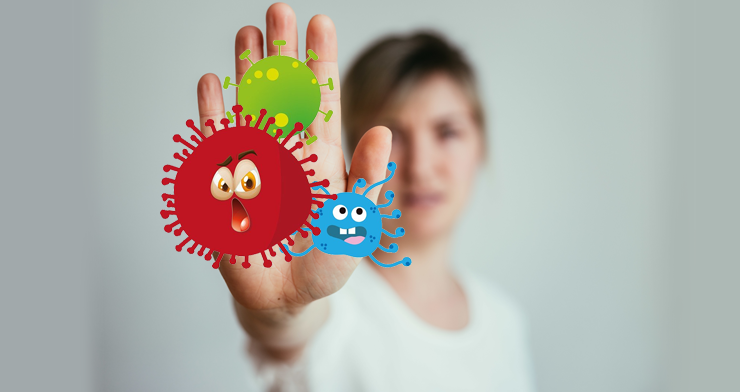Human beings live constantly accompanied by microorganisms, viruses and bacteria, which are in the food we eat, in the dust on the ground and even in the objects that we innocently use every day: our clothes, our comb, our toothbrush…
The initial difference between these two types of microbes is that in the kingdom of bacteria some are part of us (the intestinal microbiota) and others cause us diseases, but in the kingdom of viruses, visitors only come to cause problems.
The immune system does not consist of a single organ that performs all functions in a unitary and personal way; rather, it is an intelligence distributed throughout the geography of our body, between organs, tissues and cells, with widely distributed functions, and that acts with the effectiveness of a synchronized swimming team. Its function is to recognize occasional visitors and decide if they are friends or enemies
.
At the immune level, we have three defense barriers, primary, secondary and tertiary, that allow animals and humans to detect foreign substances, neutralize them and eliminate them before they harm any part of the body.
Primary Barrier: skin, mucous membranes, saliva and tears.

When skin is healthy and healthy, viruses may not be able to penetrate. In the case of mucous membranes, they act as one, there is a common system of mucous membranes, that is, all of them communicate, so if one of them is not healthy, it is likely that the rest is not healthy either.
This is why when we have skin problems they advise us to take care of our intestine, it may seem meaningless, but fixing the first one improves the
second.
Secondary Barrier or Innate Immunity
The second wall is white blood cells in their various forms, such as macrophages, basophils, neutrophils, eosinophils and monocytes. When the primary barriers fail to operate properly, the secondary barriers are put into operation
.
The first measure to control the invasion of microorganisms is phagocytosis. This process is carried out by white blood cells, their leukocytes defend us against viruses, bacteria, parasites or foreign substances, and eliminate (and even recycle) dead tissues. But to fulfill their mission, they need specialized cells such as macrophages and neutrophils
.
Tertiary Barrier or Acquired Immunity
When we have an infection, the number of microorganisms in the body increases. The appearance of these microbes, together with substances released during phagocytosis, kick-start tertiary-level defense. In the third barrier we find B cells and T cells
.
Lymphocytes are manufactured in the bone marrow and mature there to become B cells, or they travel young to the thymus gland where they remain until they migrate back to the bone marrow as mature T cells. B lymphocytes become the bodys military intelligence system: they detect the presence of an invader (antigen), immobilize it and produce specific antibodies for it, which will then form part of the bodys immune memory. T-lymphocytes, on the other hand, act directly on the pathogen: as if they were well-trained soldiers, they immediately destroy the invaders detected by the intelligence system
.
When antigens and antibodies come together, invading microorganisms lose their toxicity to the body.
Loss of immune efficiency
Loss of immune efficiency occurs when some component of this organized immune system is inefficient. Immunodeficient people have a reduced capacity to produce antibodies and this causes viruses and bacteria to find a weakened defensive system and can easily penetrate
all barriers.
There are many causes:
- Social factors (malnutrition, toxic habits, etc.)
- Physical factors (overweight, obesity, genetics, etc.)
- Psychological factors (stress, mood)
- Age or gender.
Why are there many people who have low defenses without a reason to justify it?
The answer has been offered by doctors when they find that there is a global involvement of the body in situations of risk. The immune system continuously receives signals from different organs (the stomach, the endocrine system, the nervous system, the pancreas…) and acts to respond effectively to many stimuli that arrive at the same time and that do not come only from the massive influx of pathogenic microorganisms
.
What can we do to care for and protect our immune system?
 Taking care of the intestinal flora, the first barrier, is the most important measure to keep us healthy. Food and probiotic bacteria are our best allies to achieve this (The word probiotic comes from the Latin pro which means “for” and bio which means “life”). Eating well gives us life and takes care of our friendly bacteria. Two steps in one.
Taking care of the intestinal flora, the first barrier, is the most important measure to keep us healthy. Food and probiotic bacteria are our best allies to achieve this (The word probiotic comes from the Latin pro which means “for” and bio which means “life”). Eating well gives us life and takes care of our friendly bacteria. Two steps in one.
A positive state of mind with a realistic attitude will also defend our immune system and give us enough energy to fight the most complicated situations… and even to come out stronger.
We must and can also exercise, each in our own way.
The resolutions to go to the gym and eat less, which we make every beginning of the year, should be reviewed and changed to a lifestyle that includes less “emotional” foods (chocolate, industrial pastries, saturated fats), more important nutrients (Calcium, Iron, Potassium), more exercise and more relationships that provide us with warmth and self-esteem.
These are the real, stimulating and effective foods for our Immune and Emotional Systems.



